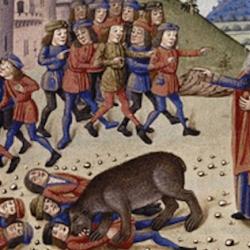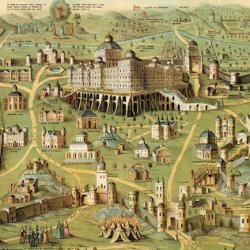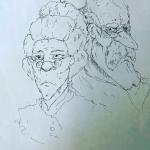In an article on 2 Kings 24-25 in The Postcolonial Biblical Reader , Kari Latvus notes tyhe two lists of deportees in 2 Kings 24:12a-14/15-17: “The writer’s interest is focused on those who are somehow connected to the royal court or have wealth or status in society based on certain professional skills. Besides these mentioned groups a large part of the nation which is left in Judah is labelled just ‘poor people of the land’ (24:14).” The second time the deportees are listed, however, there is no reference to the poor: “The central difference in the latter text [vv. 15-17] is the non-existence of margins: poor are not even mentioned.”
Latvus sounds peeved at the omission, but a closer look suggests something else is happening.
Verse 12 lists the following deportees: Jehoiachin himself, the queen mother, the palace servants, captains, and officials. Verse 13 enumerates some of the treasure that Nebuchadnezzar took before verse 14 returns to list another four or five categories of exiles: all Jerusalem, captains, mighty men, craftsmen, smiths. If “all Jerusalem” is a catch-all term, then perhaps we have four categories. That would make a neat symmetry with verse 12: The king, plus four other exiles/categories; then, all Jerusalem, plus four categories of exiles. 1 + 4 is the structure of both lists.
Verse 14b mentions the “poorest people of the land.” Back to this in a moment.
Then, rather oddly, we resume the list of exiles, again with a certain symmetry in the list. Verse 15 gives us another 1 + 4 list (though a different list): Jechoiachin, the queen mother, wives, officials, leading men of the land. The intriguing difference between this list and the previous one is the fact that the king’s harem is mentioned; apart from the queen mother, the first list is exclusively male, but the second list includes a collection of women. Then verse 15 gives us another list, but one that does not follow the 1 + 4 structure we’ve seen in the rest of the passage. This list does, however, overlap with the list in verse 14: “men of valor” in v. 16 is not gibbor (as in verse 14), but the idea is the same, and the words for “craftsmen” and “smiths” are the same in both verses.
Thus, we have a symmetrical list:
A. Jehoiachin + 4 others
B. All Jerusalem + 4 categories
C. Poorest
A’. Jehoiachin + 4 others
B’. Three categories
In short, the “poorest of the land” are at the center of the literary structure. The phrase is not repeated in verse 16 because the emphasis is placed on the center of the passage.
That the author does not intend to denigrate the poor is also evident from the term used for them. They are a “remnant” ( sha’ar ), a word validated by its use of the 7000 faithful in the time of Elijah (1 Kings 19:18) and of the survivors of the Assyrian invasion of Judah (2 Kings 19:30), not to mention the use of the term in prophetic texts (Isaiah 11:11, 16; Isaiah 37:31 [identical to 2 Kings 19:30]).















